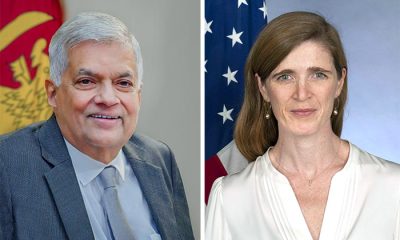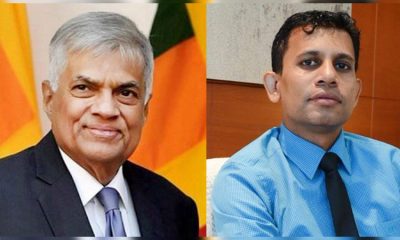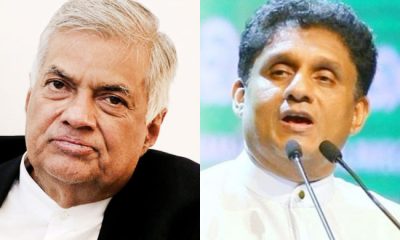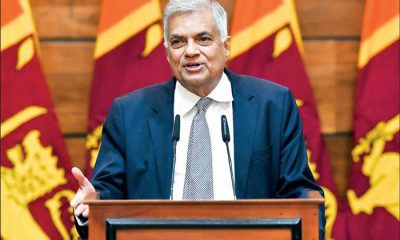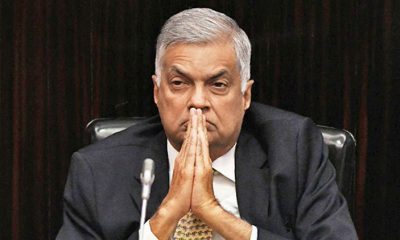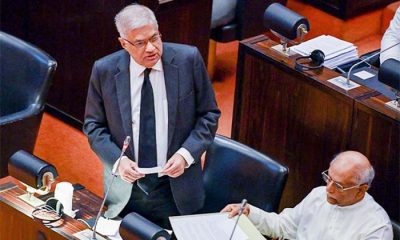Opinion
Repression not a sustainable option
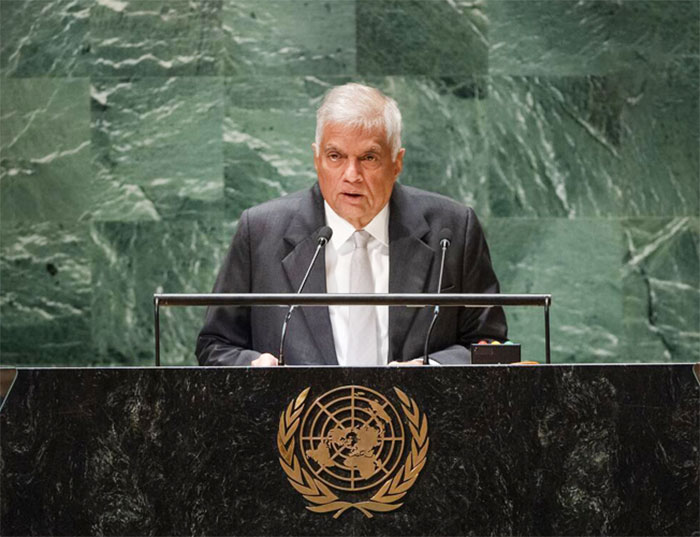
by Jehan Perera
The country to which President Ranil Wickremesinghe returned after his international successes in the Americas remains in dire straits. In both Cuba and New York, the president made his mark at the podium holding his own with giants on the world stage. Addressing heads of state at the G77 Summit in Cuba, the president spoke of the significance of science, technology and innovation in shaping the future of developing nations. He referred to the new technological divide emerging in the 21st century, necessitating the adoption of digitalisation and new technologies, such as Big Data, IoT, AI, Blockchain, Biotechnology and Genome Sequencing, to bridge the gap. He also reaffirmed Sri Lanka’s commitment to supporting the new Havana Declaration and called for the collective voice of G77 and China to be heard in international fora.
Addressing heads of state at the UN General Assembly, the President drew upon his experience in peacebuilding when he called for the expansion of the UN Security Council’s composition as essential for world peace. He also highlighted the reforms he initiated in the economic, financial, institutional and reconciliation fronts as being directed towards rebuilding trust and confidence between the people and the government and as laying the foundation for economic stabilization and recovery. However, the president faces formidable challenges in this regard. The country’s economy, which shrank by over 7 percent last year and by 11 percent in the first quarter of this year, continued its downward plunge with a further shrinkage by 3 percent in the second quarter. The much touted absence of shortages and queues is not due to the economic performance picking up but because people have less money to spend.
With inflation in the past year having halved the real income of people, and high taxation of those in the tax net further impoverishing those in the middle income and professional categories, they are leaving the country in droves leaving behind gaping holes in various sectors of crucial importance to the economy. But the tax reforms that have impacted on the middle and professional classes directly and the increased sales taxes that have impacted on the poor are still not covering the gaping hole in the country’s finances that need to be filled for IMF support to be forthcoming. Government revenue has seen a shortfall of Rs. 100 billion as compared to the revenue target agreed with the IMF. There is a clear need to utilize tax money in a more streamlined way without it being misallocated or pilfered on a large scale which is widely believed to be a continuing practice in the country.
INEQUITABLE BURDENS
The indications are that further economic hardships will need to be placed upon the people. The problem is that the government is placing the burden disproportionately on the poor and not on the rich. Dr Nishan de Mel who heads the Verite Research think tank that has been doing in-depth analyses of Sri Lanka’s encounter with the IMF disagrees with the government’s position that banks would collapse if the banking system had to bear some burden of domestic debt restructuring. He points out that this conclusion had been reached without any analysis. “All the other countries that restructured debt shifted part of burden debt restructuring on to the banking sector. There are ways of protecting banks during debt restructuring. The government has placed all the burden on the pension funds and says that the impact on these funds are limited. It also claims that banks will collapse if they are affected by domestic debt restructuring. So, which claim is true? Why can’t the banks share part of the burden?”
There is a general consensus that the burden of economic restructuring is falling disproportionately upon the poorer sections of society. Dr de Mel has also pointed out that the government has been privatising profits while socialising losses because of the lack of accountability. “When those in power work for the benefit of themselves and their friends, they ensure that a small group of people enjoy the benefits of growth or implement policies that benefit targeted groups. However, when things go wrong, for example, when we have to restructure domestic debt, those in power make sure that the people in general bear the losses. This is what we have seen in Sri Lanka.” This view is also to be seen in a Civil Society Governance Diagnostic Report produced by a collective of civil society organisations and authored by Prof Arjuna Parakrama which states that “The current growing sense of economic injustice has been exacerbated by the fact that the architects of the economic crisis do not bear any part of the burden of its proposed reform, which has been, again, firmly thrust, without any public dialogue, on the victims of this very crisis.”
Making the situation more prone to instability is the fact that this inequitable burden sharing is being done by a government that has little political legitimacy. Barely a year and a half ago, those who are currently ministers in the government were on the run, hiding from the wrath of vast multitudes of people who were demanding that they be held to account for having bankrupted the country through their corrupt and venal deeds, whether real or imagined. All of those who are now ministers (with the exception of a handful who have crossed over from the Opposition) were compelled to resign from their ministerial positions. They were legally reappointed by President Ranil Wickremesinghe after he was legally elected president by the votes of 134 parliamentarians. But a legitimacy deficit continues to haunt the government and makes it an insecure one though presently firmly ensconced in power. The way to gain legitimacy to bridge the trust deficit is to be fair and just in making decisions that impact upon all the people.
UNDEMOCRATIC LAWS
Unless remedial steps are taken the government’s current engagement with the IMF may be difficult to sustain. This is not only because the government is failing to meet the targets set by the IMF. There is also a lack of confidence about the IMF programme among the general population. A public opinion survey conducted by Verite Research has shown that about 45 percent of Sri Lankans believe the IMF will make things worse for the economy in the future. Only 28 percent of the population believes Sri Lanka’s ongoing programme with the IMF will make things better for Sri Lanka’s economy in the future. The mounting difficulties faced by people in coping with their economic circumstances can lead to protests and agitation campaigns. The logic of competitive electoral politics can also come into play with different political parties making their own promises to alleviate the economic hardships on the people even at the cost of the economic reform programme agreed with the IMF.
There appear to be trial balloons put out by government members that safeguarding the IMF programme may require a moratorium on elections. The government has shown itself willing to take this route ostensibly for the sake of the economy. Even before the agreement with the IMF, the government postponed local government elections that had been set for March of this year citing the need to focus on economic recovery rather than hold elections. Recently, MP Vajira Abeywardena, chairman of the UNP of which the president is the leader, has stated that the government would not be able to meet the economic needs of the people if funds were allocated through the 2024 Budget for the presidential election which is due in a year. The emergence of two controversial laws that can restrict freedom of expression and the ability to engage in public protest may need to be seen in this context.
The draft Anti-Terrorist Act which seeks to replace the Prevention of Terrorism Act is wider in scope and gives the government the power to arrest persons who are engaging in public protest or trade union action. Those who are charged as “intimidating the public or a section of the public” can be arrested under this law. The Online Safety bill has the potential to curtail the use of the internet for political communication purposes. It will establish a five-member commission, all of whom will be appointed by the president, and they will be tasked with determining the veracity of online content. The commission appointed by the President will be able to proscribe or suspend any social media account or online publication, and also recommend jail time for said offenses. The Bar Association has said that both these draft laws seriously impinge on the liberty and freedom of the people, will have a serious impact on democracy and the rule of law in the country and called for their withdrawal. If these two laws are passed by parliament, they will make it more difficult to challenge the government even when it is going on a wrong path. But with the economic situation continuing to get worse, and the suffering of vast masses of people increasing, repression through the use of law and the security forces will not be a sustainable option.
Opinion
Education needed about people not feeding wildlife
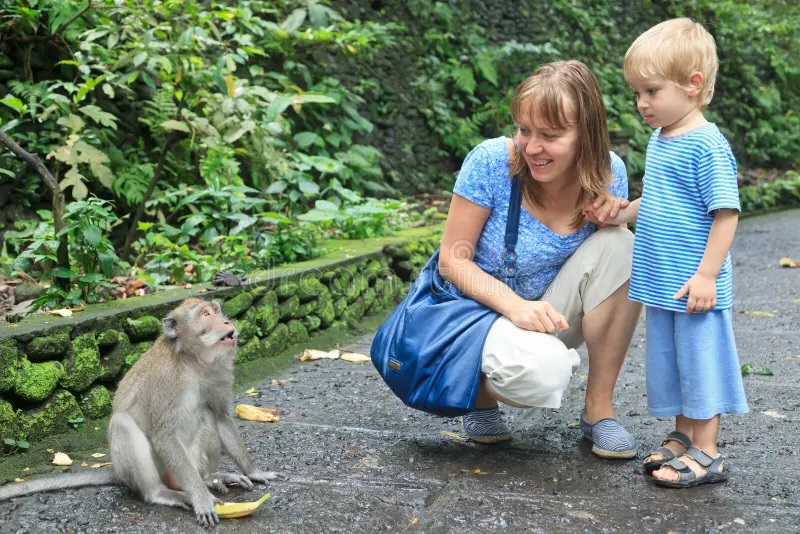
Being wildlife enthusiasts and bird watchers we took a river “safari” during a recent family trip to Bentota. We were dismayed to see that it seems to be the standard practice to feed the monkeys, I think they were the purple faced langurs, that were encountered on the river banks. Each boat that passed by stopped with boxed fruit, coconut and other odds and ends to feed them.
We managed to stop our guy from doing so but faced derision and laughter that we shouldn’t be afraid of monkeys. We tried to explain to him that this is a plague affecting Sri Lanka; elephants being fed on road sides and even in national parks, monkeys being fed from hotel balconies and apparently during river boat rides, birds being fed on hotel terraces etc.
This was met with further mockery and amused dismissal. An effort to make them understand that this was their livelihood that they were destroying it in this manner sailed over their heads. They even have a picture of a baby crocodile on the shoulders of a tourist on their billboard.
We need to consider the following:
Educate such tour operators about the importance of not interfering with the environment and the behaviour of wild animals.
Include education and training in the hotel school, and in schools in tourist resort towns about their duty and responsibility to the environment and the ecosystem on which we all depend.
If it is not already the case such operators should have licenses that should be revoked and fined if found to be engaging in such destructive acts.
Tamara Nanayakkara
Opinion
Capt. Dinham Suhood flies West

A few days ago, we heard the sad news of the passing on of Capt. Dinham Suhood. Born in 1929, he was the last surviving Air Ceylon Captain from the ‘old guard’.
He studied at St Joseph’s College, Colombo 10. He had his flying training in 1949 in Sydney, Australia and then joined Air Ceylon in late 1957. There he flew the DC3 (Dakota), HS748 (Avro), Nord 262 and the HS 121 (Trident).
I remember how he lent his large collection of ‘Airfix’ plastic aircraft models built to scale at S. Thomas’ College, exhibitions. That really inspired us schoolboys.
In 1971 he flew for a Singaporean Millionaire, a BAC One-Eleven and then later joined Air Siam where he flew Boeing B707 and the B747 before retiring and migrating to Australia in 1975.
Some of my captains had flown with him as First Officers. He was reputed to have been a true professional and always helpful to his colleagues.
He was an accomplished pianist and good dancer.
He passed on a few days short of his 97th birthday, after a brief illness.
May his soul rest in peace!
To fly west my friend is a test we must all take for a final check
Capt. Gihan A Fernando
RCyAF/ SLAF, Air Ceylon, Air Lanka, Singapore Airlines, SriLankan Airlines
Opinion
Global warming here to stay

The cause of global warming, they claim, is due to ever increasing levels of CO2. This is a by-product of burning fossil fuels like oil and gas, and of course coal. Environmentalists and other ‘green’ activists are worried about rising world atmospheric levels of CO2. Now they want to stop the whole world from burning fossil fuels, especially people who use cars powered by petrol and diesel oil, because burning petrol and oil are a major source of CO2 pollution. They are bringing forward the fateful day when oil and gas are scarce and can no longer be found and we have no choice but to travel by electricity-driven cars – or go by foot. They say we must save energy now, by walking and save the planet’s atmosphere.
THE DEMON COAL
But it is coal, above all, that is hated most by the ‘green’ lobby. It is coal that is first on their list for targeting above all the other fossil fuels. The eminently logical reason is that coal is the dirtiest polluter of all. In addition to adding CO2 to the atmosphere, it pollutes the air we breathe with fine particles of ash and poisonous chemicals which also make us ill. And some claim that coal-fired power stations produce more harmful radiation than an atomic reactor.
STOP THE COAL!
Halting the use of coal for generating electricity is a priority for them. It is an action high on the Green party list.
However, no-one talks of what we can use to fill the energy gap left by coal. Some experts publicly claim that unfortunately, energy from wind or solar panels, will not be enough and cannot satisfy our demand for instant power at all times of the day or night at a reasonable price.
THE ALTERNATIVES
It seems to be a taboo to talk about energy from nuclear power, but this is misguided. Going nuclear offers tried and tested alternatives to coal. The West has got generating energy from uranium down to a fine art, but it does involve some potentially dangerous problems, which are overcome by powerful engineering designs which then must be operated safely. But an additional factor when using URANIUM is that it produces long term radioactive waste. Relocating and storage of this waste is expensive and is a big problem.
Russia in November 2020, very kindly offered to help us with this continuous generating problem by offering standard Uranium modules for generating power. They offered to handle all aspects of the fuel cycle and its disposal. In hindsight this would have been an unbelievable bargain. It can be assumed that we could have also used Russian expertise in solving the power distribution flows throughout the grid.
THORIUM
But thankfully we are blessed with a second nuclear choice – that of the mildly radioactive THORIUM, a much cheaper and safer solution to our energy needs.
News last month (January 2026) told us of how China has built a container ship that can run on Thorium for ten years without refuelling. They must have solved the corrosion problem of the main fluoride mixing container walls. China has rare earths and can use AI computers to solve their metallurgical problems – fast!
Nevertheless, Russia can equally offer Sri Lanka Thorium- powered generating stations. Here the benefits are even more obviously evident. Thorium can be a quite cheap source of energy using locally mined material plus, so importantly, the radioactive waste remains dangerous for only a few hundred years, unlike uranium waste.
Because they are relatively small, only the size of a semi-detached house, such thorium generating stations can be located near the point of use, reducing the need for UNSIGHTLY towers and power grid distribution lines.
The design and supply of standard Thorium reactor machines may be more expensive but can be obtained from Russia itself, or China – our friends in our time of need.
Priyantha Hettige
-

 Business4 days ago
Business4 days agoAutodoc 360 relocates to reinforce commitment to premium auto care
-

 Midweek Review4 days ago
Midweek Review4 days agoA question of national pride
-

 Opinion3 days ago
Opinion3 days agoWill computers ever be intelligent?
-

 Features11 hours ago
Features11 hours agoThe Rise of Takaichi
-

 Midweek Review4 days ago
Midweek Review4 days agoTheatre and Anthropocentrism in the age of Climate Emergency
-

 Editorial6 days ago
Editorial6 days agoThe JRJ syndrome
-

 Life style12 hours ago
Life style12 hours agoMarriot new GM Suranga
-
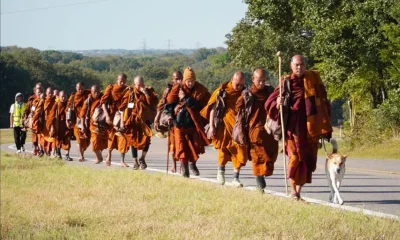
 Opinion4 days ago
Opinion4 days agoThe Walk for Peace in America a Sri Lankan initiative: A startling truth hidden by govt.


